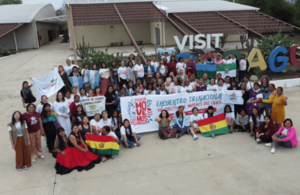Chaco Indigenous and Rural Women at COP30 with UK Support
Rural, Indigenous, and young women leaders from Argentina, Bolivia, and Paraguay will represent the Great American Chaco at COP30 in Belém, Brazil.

Rural, Indigenous, and young women leaders from Argentina, Bolivia, and Paraguay will represent the Great American Chaco at COP30, the world’s most important climate summit, with support from the United Kingdom. Their participation is part of the Chaco Project, “Weaving Networks, Building Impact: Collective Synergies for the Gran Chaco Americano,” a UK-funded initiative promoting inclusive, gender-responsive climate action and regional cooperation.
The Great Chaco, South America’s second-largest forested ecoregion after the Amazon, is a region of immense ecological and cultural significance. Home to rich biodiversity and Indigenous communities, it plays a vital role in regional climate resilience. Yet, it faces mounting challenges—including deforestation, poverty, and climate stress. The Chaco Project empowers Indigenous women and youth to take active roles in climate governance—engaging in decision-making processes, shaping policy agendas, and advocating for sustainable land management.
Delegates from the Gran Chaco
The delegation includes six women leaders representing diverse roles and territories across the Gran Chaco:
Argentina
- Ibel Diarte, Youth Representative; Qom Coordinator of the Comar Cooperative; President of the Qomlashepi Association in Fortín Lavalle (Chaco, Argentina); specialist in ICT and youth engagement.
- Tochi Benitez, Chaco Women’s Collective, supports territories in Jujuy.
- Liliana Paniagua, Executive Secretary of Redes Chaco Argentina.
Bolivia
- Arline Dayana Estrada Vaca, Youth Leader from Villa Vaca Guzmán, Bolivian Chaco. She promotes the defense of women’s rights, youth, and the environment.
Paraguay
- Nidia Beatriz Morejuan De Ruiz, advocates for women’s and Indigenous peoples’ rights; Guarani leader; MIPY.
- Teresita Cabrera, Chaco Women’s Collective and Sunu Group.
A Turning Point for Climate Action
COP30 marks a critical moment in the global climate agenda. Hosted in Latin America for the first time in over a decade, and in a country with Chaco territory, this summit offers a unique opportunity to amplify regional voices and accelerate action.
The UK is committed to inclusive climate leadership and supports the participation of grassroots actors in shaping international policy. Through the Chaco Project, the UK is helping Indigenous and young women share traditional ecological knowledge, advocate for sustainable land management, and contribute to the global effort to keep the 1.5°C target within reach. This is essential to avoiding catastrophic climate impacts.
In the words of British Ambassador to Paraguay Danielle Dunne:
Indigenous communities are on the frontlines of climate change. Their leadership and wisdom are essential to protecting biodiversity and building resilient futures
Chaco Project impact: from Territory to Global Stage
With the Chaco Project’s support, over 120 rural, Indigenous, and young women from Argentina, Bolivia, and Paraguay co-developed policy proposals and a shared climate agenda during the Trinational Gathering (30 September – 1 October). This was followed by the 6th World Chaco Summit (2 – 4 October), where more than 600 participants built a roadmap for COP30 through participatory diagnostics.
These collective efforts resulted in concrete contributions to international climate negotiations, including calls for climate finance access, land rights protection, and youth inclusion in national climate strategies—amplifying the voices of communities often left out of global decision-making.
UK Commitment
The UK continues to champion climate action that is inclusive, science-based, and regionally grounded. By supporting the Chaco Project, the UK is helping to elevate Indigenous and youth voices, foster regional cooperation, and promote sustainable development within vulnerable territories.